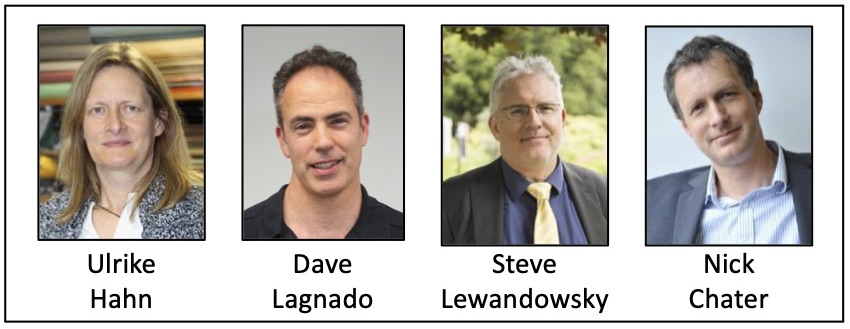There’s much talk about no longer doing “business as usual.” As scientists who have the potential to contribute to reducing the spread of COVID-19, how do we change our ways of doing “science as usual” to rapidly, and responsibly, disseminate information to policymakers and the public?
Hahn, Lagnado, Lewandowsky, and Chater (pictured below) recently wrote a paper in which they discuss the need to change our community so we can move quickly in response to the COVID-19 crisis. As they noted, we have important information, based on empirical evidence, that can help address COVID-19 related issues, including, using technology to work and learn effectively, reducing the spread of misinformation, the list goes on and on.

Hahn and colleagues recommended the following solutions to potential roadblocks.
“Proper science without the drag”
How do we speed up the typically lengthy review and editorial processes? Hahn and colleagues recommend that COVID-19-relevant manuscripts, and crisis-relevant work only, should be peer-reviewed and the decision is a yes or no decision (no “maybe” with further experiments, text rewrite, or including so-and-so’s theory). A simple yes or no decision should be quickly made and made quickly available. And once published, it would be clear that these papers went through this review and editorial process.
They also recommended that
- prepublication papers to be clear about where they stand in the review process
- encourage post-publication comments
- share data and code over time
- create a wiki section on policy-related conclusions
Regarding content, Hahn and colleagues suggest that theoretical debates be shelved, and the focus be placed on shared predictions and agreed on empirical results.
Where legitimate disagreements remain, they should be made known to policymakers, and new forms for managing disagreement such as having other scientists act as mediators to help decide which is the stronger position should be developed.
“Managing expertise”
Who are the experts? If it’s you, say so, but if you don’t know an answer to a question, don’t blag it and instead recommend another expert who does know. There’s a clear need to set up databases that have this information on hand and these need to develop dynamically as people acquire new expertise. Extant ‘expert databases’ (e.g., from learned societies) are too restrictive for the challenge.
“Breaking down silos”
Scientists from different disciplines and even subfields of psychology often try to answer the same questions about the same problems by using different approaches. Despite these similarities, some of our terms differ leaving us unaware of related work by others on the same topic. We need large scale virtual forums for exchange, as well as wiki-like summaries, that integrates information to be shared across the community.
“Supporting policy makers: what the wider community can and cannot do”
Scientific knowledge can be used to identify weaknesses in proposals for policy changes. Having a public thinktank forum where scientists can weigh in could create a more transparent and robust process that will lead to stronger policies.
“Funders”
To do the research, money is needed. Hahn and colleagues recommended that small, rapid response proposals are considered, both to boost epistemic diversity and because the nature of the crisis itself necessitates resilience.
“Guarding against adversarial disruption /avoiding politicization”
Scientists have different personal values and political viewpoints, and we need to remain agnostic when making scientific recommendations to policymakers. Codes could be developed so that we remain neutral in our dissemination and advice.
Also, to combat the spread of misinformation, the science should be put into guidelines for our scientific community.
Creating a forum for Crisis Knowledge Management
Hahn and colleagues welcome critiques, recommendations, and other ideas. And, above all, they hope for behavioral scientists to pull together and adapt.
For this purpose, they have created a Twitter account (@SciBeh) and three moderated subreddits to coordinate research ideas:
- reddit.com/r/BehSciResearch/ for discussion of research, ideas, study designs, and post-publication critique. (Visible to anyone but posting only by members who join and are recognized as experts.)
- r/BehSciMeta for discussion about how to reshape the scientific process. (Visible to anyone but posting only by members who join and are recognized as experts.)
- r/BehSciAsk a query forum for researchers, policy makers and journalists. Any member of the public can post questions.
If you have never used reddit before, this comment by Stefan Herzog explains the purpose of our subreddits, and how the scientific community can benefit, extremely well.
Go have your say!
Article focused on in this post:
Hahn, U., Lagnado, D., Lewandowsky, S., & Chater, N. (2020). Crisis knowledge management: Reconfiguring the behavioural science community for rapid responding in the Covid-19 crisis. https://psyarxiv.com/hsxdk
